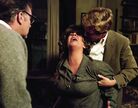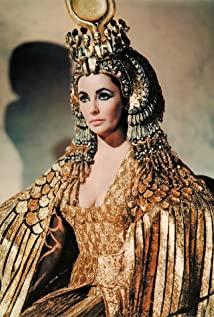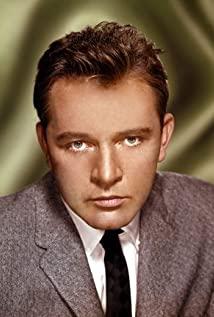"Sweet Night" is based on Edward Albee's Tony Award-winning play. Albee said in a 2005 interview that then-producer and screenwriter Ernst Lechmann paid $250,000 to adapt the script, but after it was done, director Mike Nichols and the Burtons hated it. In that script, they changed almost all the lines, and only kept two lines at the end, and Albee said those two lines were worth $250,000. It was a good deal. Since the film is adapted from a play, we see the usual hallmarks of this type of film: a small cast, few scenes, few costume changes, and a short period of time. But Spring Night was the most expensive black-and-white film at the time, costing $7.5 million. Among them, Taylor's salary is 1.1 million (plus 10% of the film's dividend), Burton's salary is 750,000, and the other major is 500,000 paid to Albee (royalty + screenwriter fee). Famous actor Jack Lemmon once accepted the role of George, but changed his mind the next day without any explanation - sources said he was asking too much for Warners to accept. This film is the first film made by Mike Nichols. Before that, he was already a well-known Broadway theater director. Because of his good relationship with the Burtons, he was specially invited by Warner Bros. to direct. Nichols did a pretty good job of moving the play from stage to screen, choosing to focus on the actors, and moving the camera as much as possible, earning him an Academy Award nomination for best director, and the following year he He won the Academy Award for Best Director for The Graduate.
This is a film that will never go out of style. All actors are only four people and two couples, but it reveals the marriage crisis of the middle class and the hypocrisy of intellectuals: you think it is a marriage film, but it throws people's communication Pale bombs of mutual deception and indifference; you thought it was a moral film, but it released several crimes into the sky with ease; you thought it was a suspense film, but it greeted the beautiful dawn after everyone revealed the truth and completely collapsed; you thought it was a comedy The film, its chattering dialogue from beginning to end is simply pulling your nerves all the time and making you suffer. The full moon at the beginning of the film and the sunrise at the end of the film are in stark contrast. The story takes place after 2:30 in the morning. People who are asleep have frequent dreams, and people who are awake are at the most vulnerable stage of willpower and the most defensive. When weak, the devil rampages and hatred spreads. It is not difficult to understand why after everyone tore their skins, the first ray of sunshine of the dawn illuminated the house peacefully, and the couple could still hold hands and return the house. The comedy factor is that its thin eggshell, when tapped lightly, will flow out the backlog of blood, tears and resentment for several years.
From the lies and truth-telling of the two couples, we can roughly sort out the trend of the truth: George, a teaching assistant in the history department, shot his mother and killed his father in a car crash for some reason when he was young. In the "Gin Wine" joke, the protagonist is actually himself. Before marriage, he was a freak who was sought after by everyone. After marriage, he became the object of contempt by a powerful wife and father-in-law. He tried to publish his life through the powerful father-in-law of the principal, only to be ridiculed by the latter. With little ambition in his career, he could not become his father-in-law's successor and right-hand man by "inheriting his father's business". Instead, he was always content to be a professor and teaching assistant. He was able to endure the coldness of his wife and father-in-law for many years not only because of his tolerance and mediocrity, but more importantly because he was infertile. How strong is self-esteem, how strong is the desire for revenge. On this night, he tried to destroy himself, his family, and the families of others, and when dawn came, the people who woke up became volcanoes that subsided longer after the eruption. He has a masculine rationality, so the dawn after dismantling his wife also means returning their lives to reality and accepting each other's shortcomings; he also has a manic mania, and the act of raising a gun and trying to shoot his wife in the back of the head is believed to be the case of many couples. idea.
Martha, a housewife who only cares about fun, her father's wealth can make her a life-long comfort and a high standard of living. She is accustomed to a pampered life. She is self-centered, quick-talking and stinging, and strives to be both at home and in communication. prevail. However, other than that, she is the least scheming one. She is so simple in her mind that she will ask for what she likes, or she will cry like a child, and then she will be obedient for a while and then continue to be lawless. She admitted that the happiest days in her life were given to her by George, and only he understood her secrets and thoughts. Because her husband was infertile, she made an appointment with her husband to make up the existence of a son, but it was only a secret for the husband and wife. In their imagination, the child gradually grew up to sixteen years old. As a perceptive creature and a straightforward woman who always expresses what she has in her heart, the unspeakable happiness in Martha's heart gradually expands. Even though she knows that all this is fake, she can't help but hope to express it. Her broken promise made her husband feel betrayed and incompetent, and George mercilessly killed their imaginary son. The common feature of this couple is that they are stubborn. When they chat, their thinking will only focus on their own attitudes and opinions, and they will not even give others a chance to interject. It can be said to be the laughing point of the whole film, but it is a problem after laughing. : It's been a long time since we listened to others.
The young biology professor can be said to have a successful career, but his wife gives a strong sense of incompatibility, both externally and internally. Sure enough, he confided the truth to George by drunkenness. There are only two reasons for marriage: the wife inherits Got a big inheritance and got pregnant. Compared with the daring George, this young man is definitely synonymous with hypocrisy and gray morality. He flaunts himself with a gentleman's demeanor and a high degree of education, and once he has the opportunity, he will release the rambunctiousness in his bones. What supports him on weekdays is the little sense of responsibility left, but his heart is full of adultery and depravity. The biology professor's wife cried and howled completely disregarding her manners, and the most shocking thing was that it was not a false pregnancy, but she was afraid of conceiving and used her wrist to let the child go. Although she is in the same situation as Martha: from a good family, both married a scheming husband, and they both teach at a university. The two women also take the initiative to control fertility. The difference is that the younger generation is more individualistic, while the older generation hopes to maintain marriage and support life through children. Martha's hysterical crankiness will be a reflection of her future life. The conflict between the couple has been ignited by the Georges. Sooner or later, they will embark on the road of marriage that is relatively silent or deceived to each other, find the passion of life in the endless ridicule of each other, and then wash away the cancer with tears, when the dawn comes Holding hands and smiling.
There's a lot going on in the performances of the actors in this film, and all four actors were nominated for Oscars, with Taylor and Denise winning each. Although Burton missed the best actor, his performance is also a fascinating masterpiece. His portrayal of George is snarky and bored, and his viciousness in the last few shots is terrifying. But at the same time, we also see flashes of deep loyalty, compassion, and love for his old shrew wife. Although he looked up to her when he did whatever he could to make her miserable. BTW, Burton was on set to celebrate his 40th birthday and his wife Taylor gave him an Oldsmobile luxury sports car. From Elizabeth Taylor's very first line, Martha is definitely the personification of dissatisfaction and resentment. In order to live out the image of the grumpy woman, Taylor put on about 30 pounds, had makeup artists make her look older than her actual 34 years old, and Warners even made the movie black and white to help her look old, but that was all It's not the point of Martha's character that is so uncanny - it's the inhuman hatred and bad-temper that trickles out of her in almost every shot. Viewers are fully convinced that this is a woman who is completely disappointed in life and doesn't care what anyone else knows, and her only motive seems to be to bring everyone around her into the abyss of despair. For some, this may elicit sympathy, but it is almost impossible to develop any understanding of Martha.
Young actors Segel and Denise have done a good job of matching these two superstars. Their emotions and reactions are on full display, from youthful confidence and recklessness to world-weary for him, and from innocence and confusion to drunken madness and indulgence for her. Eventually, there is a certain level of helplessness for their characters, who seem to see their future in George and Martha's relationship, and realize that the mistakes they've made have set them on the path of no return. on the way to failure. Under the control of these four good actors, the ambiguity of the characters in the film acts as a kind of fun mirror that reflects the ups and downs of any relationship. The process of destroying each other between them is not pleasant, but the performance of the actors is really good. 's great. Interestingly, this film is also the only film in Oscar history to date with two married characters competing for the acting award. While Sandy Denise won the Oscar for Best Supporting Actress, she also paid a heavy price for the film—she got pregnant during filming and miscarried on set.
After its release, "Spring Night" was unanimously praised by audiences and critics. It was nominated for 13 Oscars, including best picture, best actor and actress, and best supporting actor and actress. The second actress crown after "The Prostitute", she later said that Martha was the best role in her performance career. The film grossed $40 million worldwide, earning both fame and fortune. In 2007, the American Film Institute (AFI) ranked "The Greatest Film of All Time" at No. 67, which is well-deserved for such a high-level art film.
View more about Who's Afraid of Virginia Woolf? reviews










